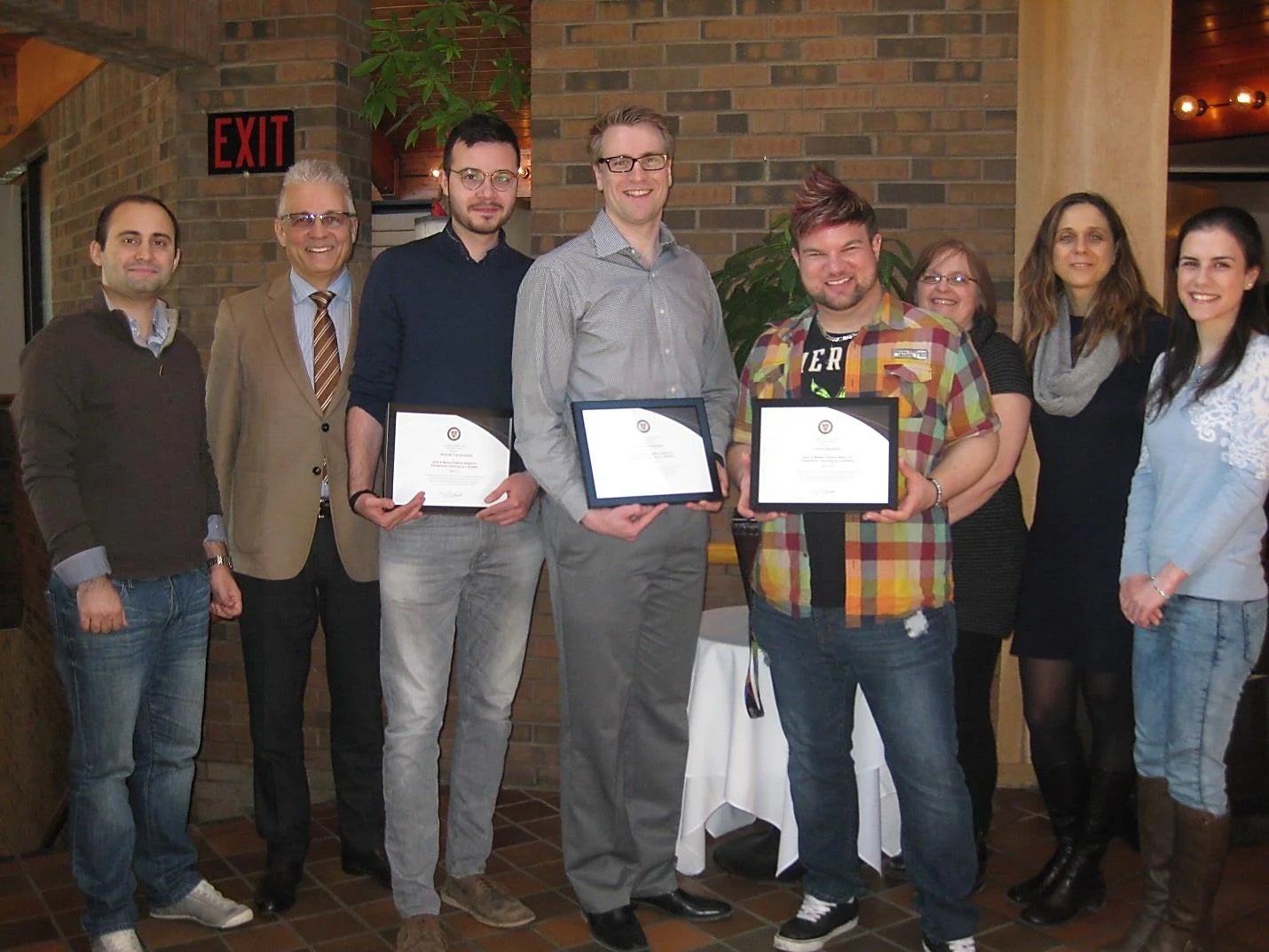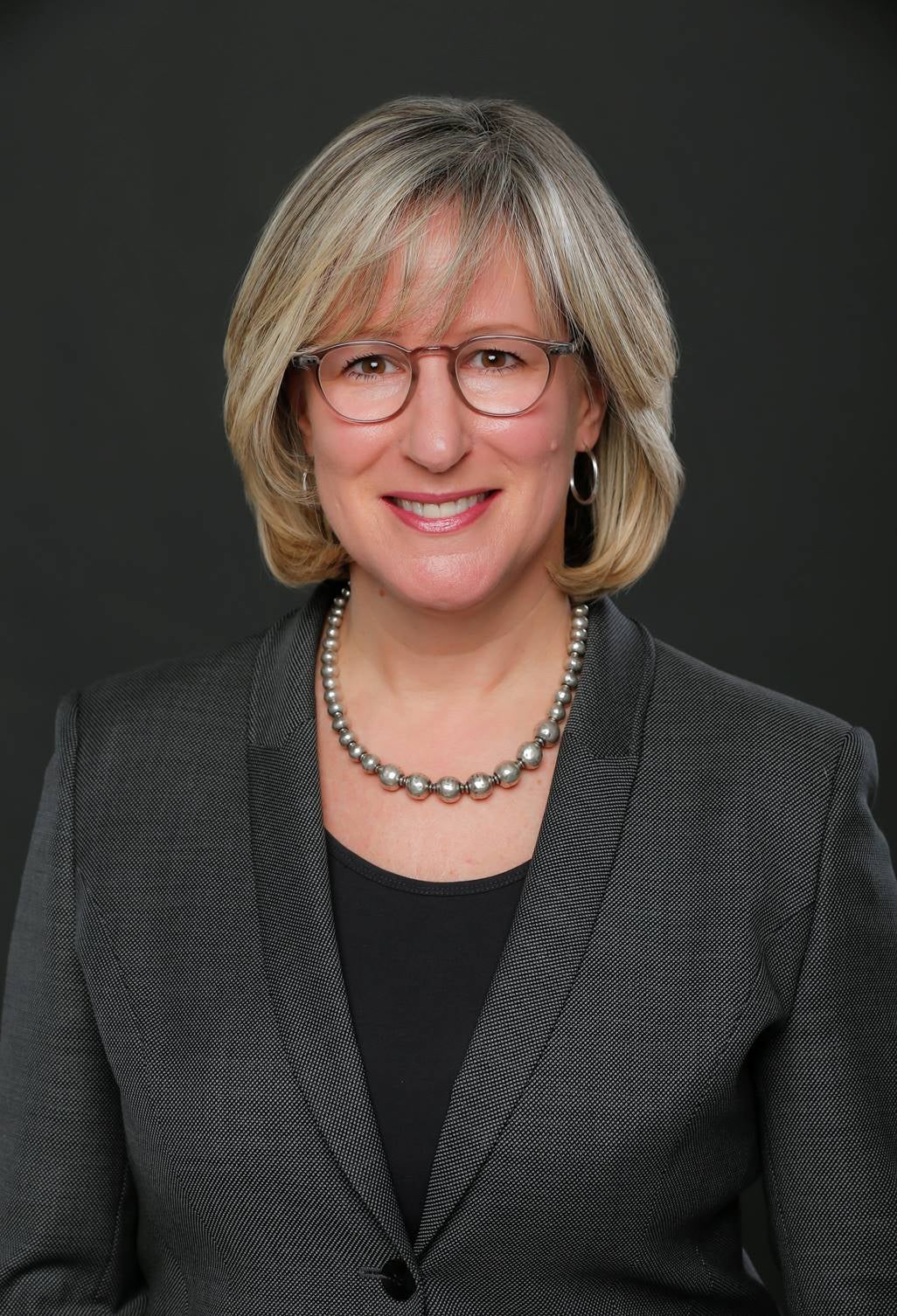Editor:
Brandon Sweet
University Communications
bulletin@uwaterloo.ca

On Wednesday, April 1, the Centre for Teaching Excellence (CTE) hosted a luncheon for the winners of the Amit & Meena Chakma Awards for Exceptional Teaching by a Student (AETS) and the members of the selection committee at the University Club.
Pictured above are (left to right) Hadi Hosseini (committee member), Jim Frank (committee chair), Mostafa Farrokhabadi (AETS award recipient), Nathaniel Stevens (AETS award recipient), Tommy Mayberry (AETS award recipient), Verna Keller (committee secretary), Svitlana Taraban-Gordon (committee member), and Zahra Razavi (committee member).
Sandra Banks begins as VPUR

Sandra Banks, formerly the CEO of The Royal Agricultural Winter Fair, takes office as Vice-President, University Relations today.
"Sandra Banks is a dynamic and energetic leader who brings a great depth of experience from the public and private sectors to the University of Waterloo," said Feridun Hamdullahpur when Banks was named to the position in February. "I am delighted to welcome Sandra to the University’s leadership team. I’m confident that she will help our collective efforts to find new ways of achieving our goal to be recognized as one of the world’s top innovation universities."
Banks spent 15 years at Coca-Cola Canada as Vice-President, Public Affairs and Communications and was responsible for the company’s brand communications, stakeholder, media and government relations activity, corporate social responsibility and internal communications.
Banks also worked as the assistant deputy minister in the food industry division at Ontario’s Ministry of Agriculture, Food and Rural Affairs in 1996 and 1997, and as press secretary in the Office of the Minister of State for the Canadian Wheat Board from 1984 to 1987. Additionally, she served as senior vice president, government affairs with Food and Consumer Product Manufacturers of Canada.
As Vice-President, University Relations, she will lead the University’s integrated government relations, community relations, marketing and strategic communications teams.
Bruce Campbell named interim CIO

"I am pleased to announce that Bruce Campbell has accepted my request to serve as interim CIO, beginning July 1, 2015," says a note from Vice-President, Academic & Provost Ian Orchard circulated last week. "Bruce will serve as the interim CIO until this role is filled permanently."
Campbell is currently Director, Technology Integrated Services (TIS), which has overall responsibility for much of IST’s core IT infrastructure and related services. Previous to this, he has held roles as IST’s Director of Network Services, the Manager of the Faculty of Science’s computing department, and a number of technical and IT leadership roles in the Faculty of Engineering.
"I am confident that Bruce’s experience will provide stability and momentum for IST in the coming months," the provost's memo concludes.
Designing a world of hope in Haiti
Fourth-year civil engineering student Marcie van Weerdhuizen returned home recently from a project trip to Marotte, Haiti after making an impact on the lives of underprivileged children through her technical skills.
Van Weerdhuizen was part of a team of architects and engineers from across North America who volunteered their time with Engineering Ministries International Canada to provide master planning and design for a new Children’s Centre in Haiti. The current Welcome Home Children’s Centre operates out of a rented facility that is at capacity, and the lease is expiring.
The eMi volunteers spent time catching the vision for an expanded facility and determining future programming, as well as surveying the site and exploring infrastructure options. Van Weerdhuizen assisted with analyzing site drainage issues and prepared civil site drawings. At the end of the week, the team presented a master plan and building design to Welcome Home.
For van Weerdhuizen, the trip to Haiti is part of a larger experience with Engineering Ministries International. Van Weerdhuizen is currently interning with eMi Canada in Calgary, where she will finish up design work for the Welcome Home Children’s Centre project as the team continues to work on more detailed elements of the design. Engineering Ministries International will provide Welcome Home with a final report and construction details in the coming months.
Board of Governors meets today; other notes
The University's Board of Governors will meet tomorrow in the Tannery Event Centre on Charles Street in Kitchener at 1:30 p.m. Among the agenda items:
- Approval of sabbatical and administrative leaves for 39 faculty members;
- Approval of incidental fee changes including the Student Services Fee and the Imprint Fee (an increase to which was approved at the newspaper's general meeting in February);
- Approval of the staff salary recommendations that will see increases of 1.95 per cent in 2015/2016, 1.95 per cent in 2016/2017, and 1.5 per cent in 2017/2018, the application of the normal merit program for USG staff members, the commitment to a comprehensive compensation review to take place in the 2015/2016 fiscal year;
- Approval of the 2015/2016 Operating Budget; and
- Approval of a stipulated price contract to Harbridge + Cross Limited for $5,183,00 for the Hagey Hall courtyard infill project in the Faculty of Arts.
The governors will receive a number of reports, enjoy a student entrepreneurship presentation, and have the opportunity to tour the Velocity Garage following the meeting.
Human Resources is offering an information session for new faculty and post-doctoral fellows at the University who hail from the United States:
"Interested in learning more about your American tax filing requirements? Human Resources is pleased to offer an US tax information session for our employees. Bring your lunch and join a seasoned tax professional from KPMG who will cover the following topics:
- Moving to Canada and Overview of Canadian and US Tax Systems;
- US Filing Requirements for US Citizens;
- Additional Reporting Requirements; and
- Other Issues Facing US Citizens in Canada.
The information session will take place on Tuesday, April 7 from 11:30 a.m. to 1:00 p.m. in DC 1304. Registration is not required.
The featured guest speaker is Stephanie Sinclair, senior manager - US and cross-border tax, from KPMG. She is a senior manager in the US and Cross-Border Tax Services Group and a member of that group since 2009. She has extensive experience assistance taxpayers with various cross-border issues in addition to compliance requirements.
"Her projects and client assignments included assisting taxpayers in becoming compliant in the US under the Offshore Voluntary Disclosure Initiative and the Streamlined Process, strategies to reduce overall US and Canadian tax liability, and advisory services such as expatriating and estate planning. Stephanie holds both a Canadian CA and US CPA designation and has a Masters of US Taxation."
Today is the last day for Residence Living-Learning drop-in tutoring sessions before exam season ramps up.
And finally, a reminder that registration has opened for the Matthews Golf Classic.
Campus police issue message about weekend robberies
"Over the past weekend there were two separate incidents on campus where a student was assaulted and had property taken. On April 3rd at 11:15 p.m., a student was confronted near Village 1 by three black males with a handgun who stole some of his property. On April 4th at 9:50 p.m. another student was assaulted by three or four black males near Beck Hall at UWP. Some of his property was also taken. It is possible that a Mazda 5 was involved."
"Waterloo Regional Police and UW Police are actively investigating. Please be cautious and observant when walking at night on campus. Anyone with information is asked to contact WRPS at 519-653-7700, UW Police at 519-888-4567 ext 22222 or use the UW Police anonymous reporting webpage.
Link of the day
When and where
OHD Staff Conference 2015, Tuesday, April 7 and Wednesday, April 8. Details.
Department of History presents Professor Eric Jennings, University of Toronto, “Global, Colonial, and Transnational Paths: Thinking through Francophone Spaces in World War II and Beyond,” Tuesday, April 7, 10:30 a.m., Ev3 4408. Refreshments provided.
Human Resources presents US Tax Information Session, Tuesday, April 7, 11:30 a.m., DC 1304.
Board of Governors meeting, Tuesday, April 7, 1:30 p.m., Tannery Event Centre.
Institute of Biochemistry and Molecular Biology (I.B.M.B.) Seminar Series featuring Professor Jeff Smith, Department of Chemistry, Carleton University, “TrEnDi: a tool to enhance sensitivity in proteomics and lipidomics” Tuesday, April 7, 3:30 p.m., C2-361. Details.
GreenHouse Social Innovation Showcase, Tuesday, April 7, 4:00 p.m., STP 201. Details.
Centre for Theoretical Neuroscience presents the 9th Annual Brain Day, Wednesday, April 8, 8:30 a.m. to 5:00 p.m., EV3 1408. Details.
Retirement celebration for Olaf Naese, Wednesday, April 8, 3:30 p.m., TC2218. Details.
Fine Arts Life Drawing session, Wednesday, April 8, 6:30 p.m., ECH 1224A. Details.
CTE presents Clicker (CTE726), Thursday, April 9, 12:00 p.m., MC 4040. Details.
Examination period begins, Friday, April 10. Details.
Online examination days, Friday, April 10 and Saturday, April 11.
TD University of Waterloo Discover Day in Health Sciences, Tuesday, April 14, 8:00 a.m., Modern Languages. Details.
2015 UW Retirees Association Spring Luncheon,
Tuesday, April 14, 11:30 a.m. to 2:00 p.m., Luther Village. Details.
UWRC Book Club featuring "My Year of Meats," Wednesday, April 15, 12:00 p.m., LIB 407.
LEARN Instructor User Group (CTE686), Thursday, April 16, 12:30 p.m., EV1 241. Details.
WISE Public Lecture Series featuring Professor George Gross, professor, Department of Electrical and Computer Engineering, University of Illinois at Urbana-Champaign, "A Practical Framework for the Implementation of the Vehicle-to-Grid (V2G) Concept," Friday, April 17, 2:00 p.m., CPH 4333. Details.
Senate meeting, Monday, April 20, 3:30 p.m., NH 3001.
Examination period ends, Saturday, April 25.
Deadline to become Fees Arranged, Monday, April 27. Details.
Annual Teaching and Learning Conference: Opportunities and New Directions, Thursday, April 30.
PhD Oral Defences
Sociology & Legal Studies. Taline Kassabian, "Responses to youth crime in Canada: An examination of micro and macro processes associated with the tough-on-crime legislation." Supervisor, Jennifer Schulenberg. On deposit in the Arts graduate office, PAS 2428. Oral defence Monday, April 13, 10:30 a.m., PAS 2030.
English. Sarah York, "Outré Aesthetics." Supervisor, Victoria Lamont. On deposit in the Arts graduate office, PAS 2428. Oral defence Monday, April 13, 1:00 p.m., E5 3052.
Recreation & Leisure Studies. Amy Chapeskie, "A Tale of Two Schoolings: A Leisure Scholar's Autoethnographic Exploration of Different Learning Settings." Supervisor, Mark Havitz. On display in the Faculty of Applied Health Sciences, BMH 3110. Oral defence Tuesday, April 14, 1:00 p.m., BMH 3119.
Electrical & Computer Engineering. Wei-Ting Chen, "Wearable RF Resonant Transdermal Gaseous Chemical Sensor Array." Supervisor, Raafat Mansour. On deposit in the Engineering graduate office, PHY 3003. Oral defence Wednesday, April 15, 9:00 a.m., EIT 3142.
Electrical & Computer Engineering. Nazila Rajaei, "Fault Current Management in Power Systems Using Inverter Based Distributed Generators." Supervisor, Magdy Salama. On deposit in the Engineering graduate office, PHY 3003. Oral defence Wednesday, April 15, 9:00 a.m., EIT 3141.